11 Hidden Things That Affect Your Credit Score, Finance Experts Say
These surprising factors may be affecting that all-important number.
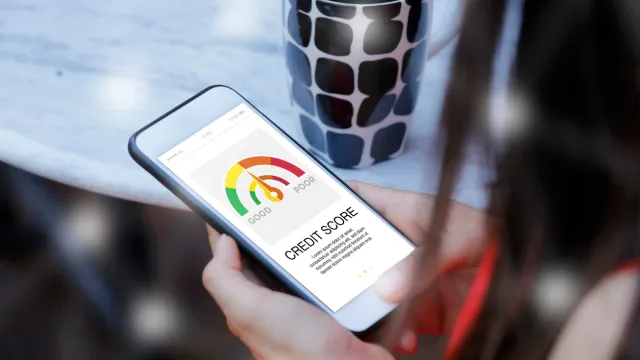
When it comes to your financial standing, achieving and maintaining a good credit score should be a top priority. The magic number is a determining factor whenever you decide to buy a home or vehicle, apply for a loan, start a business, or open a new credit card. But even if you think you understand how to protect your rating, a few lesser-known factors may be impacting your score without your notice. Read on for the 10 hidden things that can affect your credit score, according to finance experts.
RELATED: 10 Things You Should Stop Buying When You Retire, Finance Experts Say.
1
Getting rid of your credit cards too soon
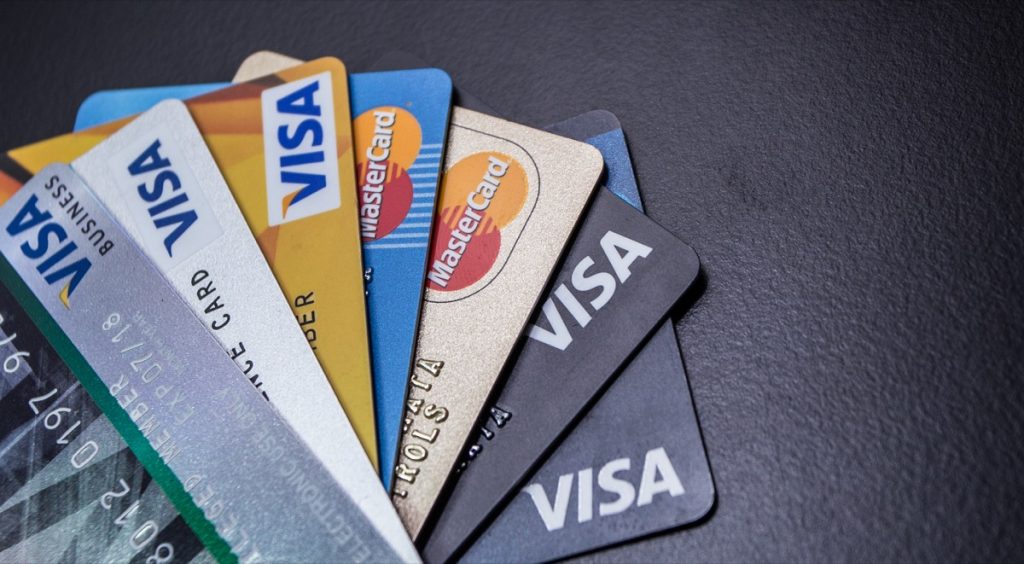
Those who have managed to get out from under a mountain of debt know that finally sending in the last payment on a credit card can be incredibly liberating. It may even feel appropriate to cut ties with the company entirely at that point. However, experts caution you might want to hold off a little while before you take scissors to plastic.
"Paying off your credit card debt is a huge milestone that deserves celebrating. But although you may be tempted to close the account once it's paid off to avoid adding a balance back on the card, don't," family finance expert Andrea Woroch tells Best Life.
"The amount of time you've had credit—also known as credit history—impacts your credit score. So you want to keep old accounts open. Add a recurring charge and set it up to pay off in full each month to keep it active," she suggests.
2
Paying your bills on the wrong dates

It's true that regularly paying your bills and keeping your spending in check can boost your credit score. But according to experts, it can also come down to exactly when you're remitting payment and how much you owe overall when you do so.
"You can also significantly boost your credit score by making sure your balance is low—or even $0—when your credit card statement closes each month," says Robert Farrington, founder of The College Investor. "For example, if your statement closes on the 15th of each month, make a payment for the full amount on the 10th. That way, when your balance posts, it will show $0 used—which can boost your credit score."
RELATED: Always Use Cash for These 5 Purchases, Financial Experts Say.
3
Not keeping the balance on your credit cards low enough

Everyone knows that running a credit card is risky when you can't afford to pay for what you're spending. But even if you're keeping your purchases in check, your overall balance might still be running a little high despite being well below its maximum—and damaging your score in the process.
"Credit scores are based on the types of credit," explains Stouffer. "The revolving credit accounts have more impact because this type of account will always change. Credit cards can be maxed out, and this will cause scores to drop considerably and only improve when balances are brought down. Usually, less than 30 percent of available credit is the acceptable upper limit. Above that, scores drop."
However, this doesn't mean you have to live under a low ceiling forever. "If you have a small credit limit and your normal spending is frequently utilizing a large amount of it, and affecting your credit score due to high utilization, call your credit card company and see if you are able to raise your credit limit," says Courtney Alev, consumer financial advocate at Credit Karma.
While it's best to increase your limit and credit card spending only if your income allows it, you can still avoid this issue without making any changes. "If you aren't comfortable increasing your credit limit and risking increased temptation to spend, you can make credit card payments more than once a month," Alev points out. "This way, your balance never gets too high."
4
Not having a mortgage

Deciding to buy a home can be one of the most important financial decisions someone makes in their life. Of course, having a good credit score going into the process can be essential. As it turns out, experts say that taking on a mortgage can also be what boosts your credit score in the long run.
"Term loans only show payment patterns and reductions in loan balance," Stoffer says. "The lack of a mortgage will hold the scores down because it implies a lack of permanent foundation in residence. A person can have a long, clear credit history consisting of multiple credit cards, auto loans, and term loans. Some accounts can be active, some can be paid in full, and there are no late payments. But the lack of a mortgage will prevent this person's rating from reaching the highest possible score for those reasons."
5
Having your credit score checked too often
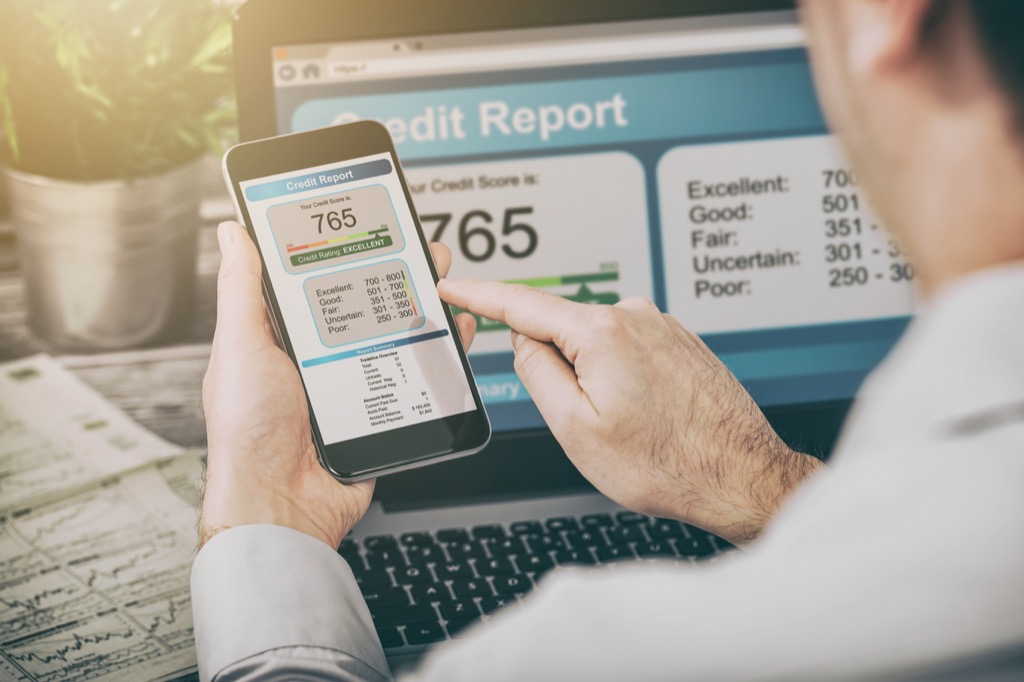
Arguably, one of the most frustrating parts about working hard to keep your credit score up is that whenever it's examined by a potential lender, it can have consequences on your hard-earned number. But experts say staying on top of how others check your score is one way to keep it as high as possible.
"When you apply for credit, the lender will typically make an inquiry into your credit history. This is called a 'hard inquiry,' and it can have a negative impact on your credit score," says Tommy Gallagher, ex-investment banker and the founder of Top Mobile Banks. "However, there are also 'soft inquiries,' which do not affect your credit score and are typically made by lenders for marketing purposes. That's why it's important to be aware of these hard inquiries and make sure that they are not being made without your consent."
Gallagher points out that most personal credit score monitors use soft inquiries and can be an easy to way to monitor for unexpected hard checks that may come in quick succession. And while you may not be able to avoid applying for multiple forms of financing due to a big move or a significant lifestyle change, you can avoid applying for too many credit cards in a short timeframe.
6
Being the victim of identity theft or fraud

Nowadays, everyone knows that their personal information is one data leak away from winding up in the hands of someone who will use it for nefarious means. But while you can't control identity theft, you can keep your score much higher if you regularly monitor for such breaches—which is one helpful tip some experts say the general public doesn't practice enough.
"If your personal information has been compromised and used to open credit accounts in your name, this can have a major impact on your credit score," says Gallagher. "It's important to regularly check your credit report and be vigilant about protecting your personal information to prevent this type of issue."
RELATED: The 6 Best Small Towns to Retire In.
7
Forgetting to set up auto pay

Technology has made some aspects of everyday life easier, but makes others more complicated. Sifting through the daily barrage of notifications to pull out the genuinely important reminders and alerts in a sea of marketing notifications, for example, is a chore. That's why even if you consider yourself organized when it comes to making your monthly bill payments, you could damage your credit score if you don't automate the process.
"It's simple: Make sure you never miss a payment," says Farrington. "You can help ensure this by setting up auto-debit, so your payments are always paid on time. Also, remember that utilities like cell phone bills, power, water, and even rent payments can all negatively affect your credit if you miss just one payment."
8
When you pay your rent
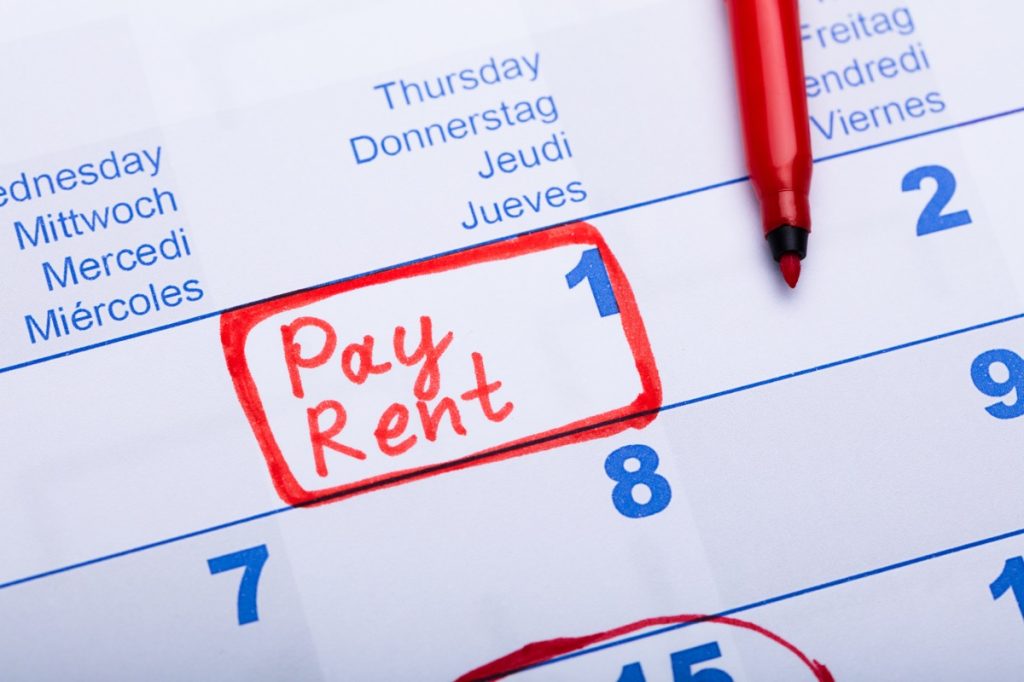
For many, the dream of buying their first home is what incentivizes them to improve their credit. But now, experts say you could help work towards this goal while still renting.
"Paying your mortgage on time is great for building your credit score, but a third of households rent," says Scott Nelson, CEO of MoneyNerd. "Renters have historically missed the boat on building their credit score this way—but that's changing."
He explains that credit bureaus like Experian, TransUnion, and Equifax have recently started counting rental payments towards people's credit scores when using third-party apps. The results also seem to be promising: A pilot program being run for renters by Fannie May saw their average credit score increase by 40 points after reporting their on-time rent payments for an entire year, he tells Best Life.
"This is greatly encouraging as it's often renters who need credit score the most as they prepare to buy a first home," he says. "The program also found that 82 percent of renters say they pay rent on time and want this to be accounted for in their credit scores."
RELATED: IRS Issues New Alert on 5 Things You Must Declare on Your Taxes This Year.
9
Racking up medical debt

An unexpected accident or illness that lands you in the hospital is never an ideal situation. Insurance may cover the financial burden that can follow even a simple treatment. However, experts warn it's important to stay on top of what you owe out of pocket.
"Medical bills can unexpectedly affect your credit score if left unpaid or sent to collections," says Taylor Kovar, a certified financial planner and founder and CEO of 11 Financial. "Even small medical debts can damage your credit if they're reported to credit bureaus."
He says it's essential to review medical bills carefully, address any discrepancies, and work with healthcare providers to establish payment plans if want to avoid any negative impacts to your score.
10
You've got unpaid utility bills or fines
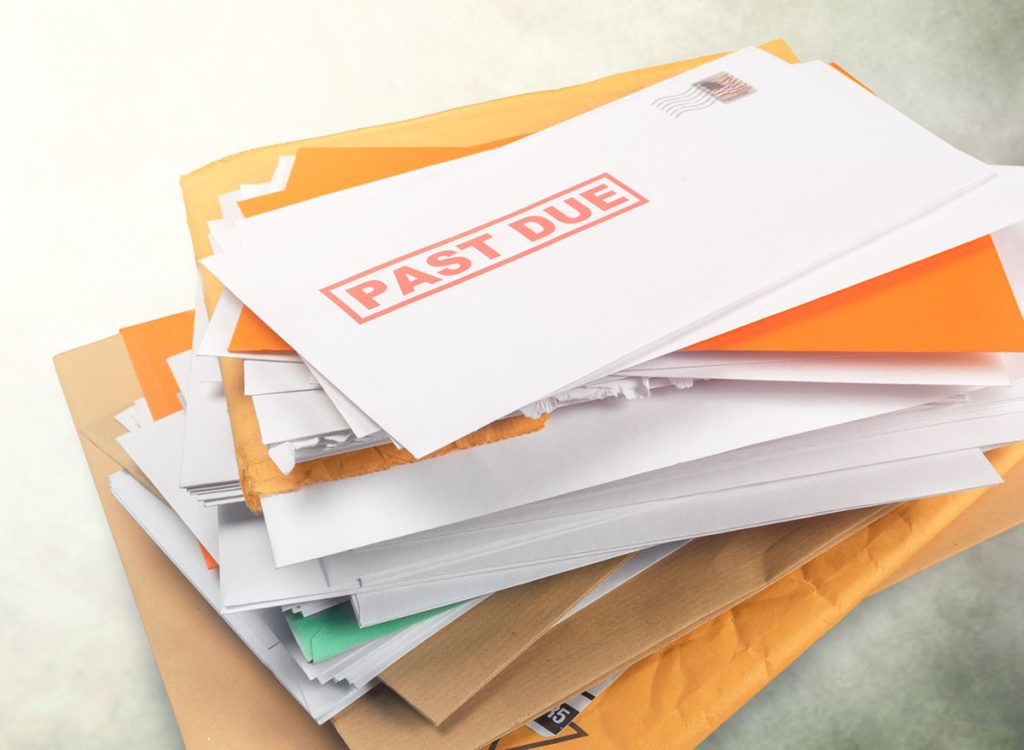
While paying your credit card bill on time might seem like the most obvious way to improve or maintain your credit score, it's not the only thing affecting your credit. Kovar says that many people overlook the impact of utility payments—including cell phone bills.
"While they typically don't appear on traditional credit reports, utility companies may report missed or late payments to credit bureaus, potentially lowering your score," he warns.
He adds that other payments can also factor in, including unpaid fines for parking violations or even library late fees. "While these debts may not seem significant, collection agencies may report them to credit bureaus if left unpaid, resulting in negative marks on your credit report," Kovar explains. "It's essential to address all of these types of debts promptly to prevent them from damaging your credit."
11
Being an authorized user on a credit card

Sharing a credit card with someone can help young people learn healthy spending habits or couples stay on top of expenses. But if you're planning on adding someone else to your account, just be aware that it could have other impacts.
"Being an authorized user on another person's credit card can affect your credit score," says Chad Gammon, a financial planner at Arnold and Mote Wealth Management. "It can help your credit score if the account is in good standing, but hurt if the account is delinquent."
Best Life offers the most up-to-date financial information from top experts and the latest news and research, but our content is not meant to be a substitute for professional guidance. When it comes to the money you're spending, saving, or investing, always consult your financial advisor directly.





















